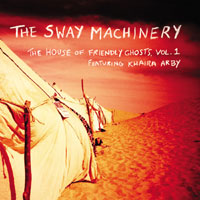World in Stereo examines classic and modern world music while striving for a greater appreciation of other cultures.
 The Sway Machinery: The House of Friendly Ghosts, Volume 1 (JDub Records, 3/8/11)
The Sway Machinery: The House of Friendly Ghosts, Volume 1 (JDub Records, 3/8/11)
The Sway Machinery: “Gawad Teriamou”
[audio:https://alarm-magazine.com/wp-content/uploads/2011/03/07-Gawad-Teriamou.mp3|titles=The Sway Machinery: “Gawad Teriamou”]Led by guitarist and lead singer Jeremiah Lockwood, Brooklyn-based band The Sway Machinery includes Yeah Yeah Yeahs drummer Brian Chase, brass players Stuart Bogie and Jordan Mclean (Antibalas Afrobeat Orchestra), and baritone-sax player Colin Stetson (Tom Waits, Arcade Fire). Though something of a name-dropper’s perfect dream, The Sway Machinery actually resembles very little of its individual parts.
Instead, under the vision of Lockwood, the collective explores Jewish cantorial music within the broader sphere of world music, injecting the ancient tradition with Afro-rhythms and blues-tinged soul. The distinct sound stems from two figures in Lockwood’s life: his grandfather, renowned cantor Jacob Konigsberg, who instilled in his lifeblood the ancient heritage of synagogue music; and Piedmont blues virtuoso Carolina Slim, who mentored Lockwood early in his career, as he played the streets and subways of New York City. It’s a far-out mix that is sacredly funky, executed brilliantly by a collective with a dense amalgamation of contemporary sensibilities.
And to slice it up even more, The Sway Machinery has enlisted one of Mali’s most respected singers, Khaira Arby, for its second record, The House of Friendly Ghosts, Volume 1. An invitation to be the first Jewish band to perform at the Festival in the Desert in Mali turned into a month-long stay where the band recorded and wrote with some of Mali’s great luminaries, including Super 11 and Vieux Farka Touré, son of the legendary Ali Farka Touré. Inspired by Mali’s strong musical tradition rooted in local soil, The Sway Machinery recorded the album in the capital of Bamako, accenting its local sounds with Arby’s willful voice at the center.
In many ways, the record plays like a travel journal; tracks like “Women Singing in Timbuktu,” “Camels,” and “Turaeg Child Singing” are exactly what the titles suggest. As a whole, the record offers many sincere moments like these, whether sound snippets from the streets or the work done in the studio. The project translates as an earnest effort to make sense of a culture through the language of music.
Though Arby is a perfect fit for the Afrobeat horns and the slew of new African instruments introduced to The Sway Machinery’s sound, she provides an interesting point of contrast to the band’s Jewish foundations and American funk and jazz flourishes. But she respectively owns some of the record’s most standout tracks, making songs like opener “Sourgou” sound like they were played by a band less on a sojourn, more on a permanent stay. The foot-stomping, Afro-funk offering “Gawad Teriamou” flaunts Arby’s fiery but effortless vocal deliveries, given life by a Gypsy-desert guitar lick, infectious bass riff, and a stabbing brass section.
Lockwood provides the other half of the record’s vocals. “Skin to Skin” is the first hint of what Lockwood has to offer, and listeners will immediately sense the intuitive connection between the musical traditions. There are, however, stark differences. It’s a singing style that hinges on Hebrew syntax and traditional Jewish melodies, a hybrid form that isn’t fully understood until album closer “Shalom Aleichem,” where Lockwood sings completely in Hebrew.
In the end, the music is the link between the two worlds. The Sway Machinery’s combination of brass and rhythm is a force to be reckoned with — a true testament to some of New York’s most accomplished musicians. Over Lockwood’s cantorial-infused vocals, and intertwined in Arby’s African cries, is a triumphant fusion that keeps a balanced variety, from the raw funk in “Youba” to the rock drumming and call-and-response blues dynamics in “All The People.”
The House of Friendly Ghosts, Volume 1 is also less overt than The Sway Machinery’s 2008 debut, Hidden Melodies Revealed, in reconfiguring the Jewish hymn. The result is a grand thesis of cross-cultural music that looks forward more than it looks back. Bringing its Brooklyn sound to the crown of West Africa, the collective successfully shrinks cultural distance and blends the modern with the Jewish folkloric.

